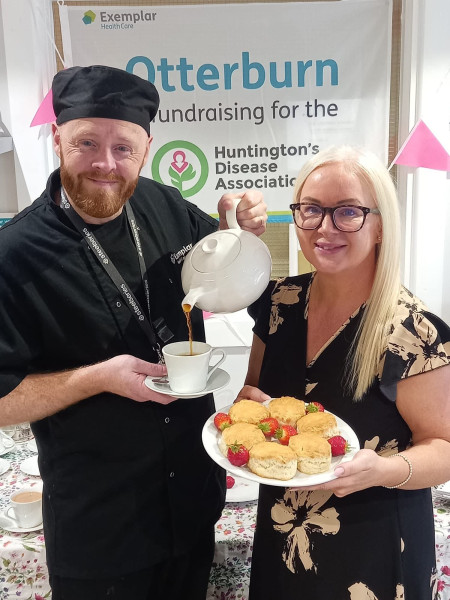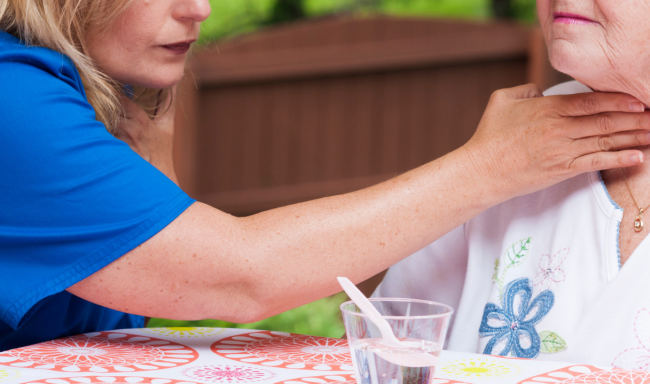The importance of care homes understanding nutritional and eating needs for people affected by Huntington’s disease.
We spoke to Otterburn Care Home Manager, Naomi and Otterburn Care Home Chef, Rob about how they manage mealtimes and nutrition in their care home.
Naomi qualified as a registered nurse in 2004 before moving into the private care sector in 2008. She joined Otterburn Care Home in 2011 and has been the Home Manager there for a number of years as well as being an Exemplar HD Champion (an internal scheme for Exemplar care homes). Otterburn is also part of the Huntington's Disease Association Quality Assured care home accreditation scheme. Rob has been a chef for around 25 years. His background was in restaurants and catering before “finding his calling” when moving into the care sector as he joined Otterburn Care Home.
Otterburn Care Home are dedicated to ensuring that their Huntington’s residents get the correct nutrition to avoid weight loss, minimise choking risk but also enjoy their food and mealtimes.
With Huntington’s, a person’s eating and drinking needs can change over time - sometimes quite quickly. That means what’s safe and enjoyable one month might need to be adapted the next. If we’re not continually learning, we risk missing those changes or not knowing the best way to respond.
Otterburn Care Home say that open communication is everything. Catering Team, Registered Nurses, Health Care Assistants, Activities Coordinators, and everyone else in the team work together and are ready to adapt when something changes.
All the staff are trained in International Dysphagia Diet Standardisation Initiative (IDDSI levels), nutrition and hydration, and Huntington’s disease-specific care so they understand why changes are made and how to apply them. If someone’s needs change, the care team flags it straight away and their food can be adjusted before the next meal.
Ongoing training gives us the skills to make meals both safe and enjoyable, whether that’s understanding IDDSI texture levels, learning new techniques, or staying up-to-date with the latest guidance. The more we learn, the more confident we are in spotting changes early, preventing risks like choking or weight loss, and making mealtimes a highlight rather than a challenge.
Accurate documentation is just as important as the food itself. Otterburn record every change to someone’s eating or drinking needs, note what works well, and log any difficulties. That way, everyone knows what’s safe and appropriate. It also means they can track weight, portion sizes, and food preferences over time, helping them to spot patterns early and make proactive adjustments.
It’s essential that the food is not only tasty and nutritious, but also safe and tailored to each person’s needs.
How do they go the extra mile?
Rob says for many people, mealtimes are the highlight of their day. He says that you should never underestimate the importance of presentation. They try to make puréed meals look delicious by shaping them with moulds, garnishing them, and plating them with care.
They involved the home in seasonal celebrations - from making mince pies for Christmas to serving pancakes on Shrove Tuesday.
If there’s a birthday, we’ll bake a personalised cake and decorate it with the person’s favourite colours or hobbies in mind. We involve residents and their families when planning menus, as they know better than anyone what they like and what brings them comfort.
Quality Assured
Otterburn is one of our accredited care homes. This means that the home has invested significant time, resources and commitment in specialist care for people with Huntington’s, to show this to the Huntington's community and benchmark the standards of care they offer. It also allows them to obtain recognition from the Huntington's Disease Association for achieving and maintaining these standards.
They currently care for seven people living with Huntington’s disease. They wanted to go through the Quality Assured process to make sure they were doing everything possible to enrich the lives of the people they support.
Being ‘Quality Assured’ approved is a huge honour for us. It’s not just a badge - it’s a promise that we’re committed to ensuring the best care for people affected by Huntington’s disease. The process gave us a chance to reflect, strengthen our practice, and give families the confidence that their loved one is in a safe, supportive environment where every detail of care is considered.
Thank you to Naomi and Rob from Exemplar Care Homes for sharing their professional knowledge with us.





